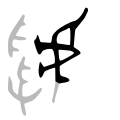Radical 141
| 虍 | ||
|---|---|---|
| ||
| 虍 (U+864D) "tiger" | ||
| Pronunciations | ||
| Pinyin: | hū | |
| Bopomofo: | ㄏㄨ | |
| Gwoyeu Romatzyh: | hu | |
| Wade–Giles: | hu1 | |
| Cantonese Yale: | fu2 | |
| Jyutping: | fu2, fu1 | |
| Japanese Kana: | コ ko (on'yomi) | |
| Sino-Korean: | 호 ho | |
| Names | ||
| Chinese name(s): | 虎字頭/虎字头 hǔzìtóu | |
| Japanese name(s): | 虎頭/とらがしら toragashira 虎冠/とらかんむり torakanmuri | |
| Hangul: | 호피무늬 hopi muneui | |
| Stroke order animation | ||
 | ||
Radical 141 or radical tiger (虍部) meaning "tiger" is one of the 29 Kangxi radicals (214 radicals in total) composed of 6 strokes.
In the Kangxi Dictionary, there are 114 characters (out of 49,030) to be found under this radical.
虍 is also the 130th indexing component in the Table of Indexing Chinese Character Components predominantly adopted by Simplified Chinese dictionaries published in mainland China, with 虎 being its associated indexing component.
Evolution[]

Oracle bone script character

Bronze script character

Large seal script character

Small seal script character
Derived characters[]
| Strokes | Characters |
|---|---|
| +0 | 虍 |
| +2 | 虎 虏SC (=虜) |
| +3 | 彪 虐 |
| +4 | 虑SC (=慮 -> 心) 虓 虔 |
| +5 | 處 虖 (=呼 -> 口 / 乎 -> 丿) 虗 (=虛) 虘 虙 虚SC/JP (=虛) |
| +6 | 虛 虜 虝 (=虎) |
| +7 | 虞 號 |
| +8 | 虠 虡 |
| +9 | 虢 虣 |
| +10 | 虤 虥 虦 |
| +11 | 虧 虨 |
| +12 | 虩 |
| +20 | 虪 |
Literature[]
- Fazzioli, Edoardo (1987). Chinese calligraphy : from pictograph to ideogram : the history of 214 essential Chinese/Japanese characters. calligraphy by Rebecca Hon Ko. New York: Abbeville Press. ISBN 0-89659-774-1.
- Lunde, Ken (Jan 5, 2009). "Appendix J: Japanese Character Sets" (PDF). CJKV Information Processing: Chinese, Japanese, Korean & Vietnamese Computing (Second ed.). Sebastopol, Calif.: O'Reilly Media. ISBN 978-0-596-51447-1.
External links[]
| Wikimedia Commons has media related to Radical 141. |



